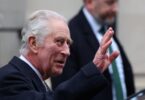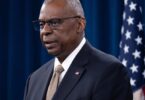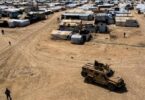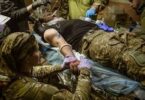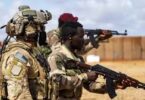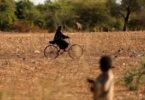Fatih Erel
GENEVA: Russian Foreign Minister Sergey Lavrov on Wednesday called on the U.S. to allow humanitarian access to the areas in Syria controlled by the American coalition.
“Russia and the Syrian government have already announced the establishment of humanitarian corridors in Eastern Ghouta. Now it is the turn to act against militants entrenched there, who still continue shelling Damascus, blocking aid deliveries and evacuation of those wishing to leave,” Lavrov said at the 37th annual session of the UN Human Rights Council in Geneva.
“We call upon the members of so-called American coalition to ensure the same humanitarian access to the areas in Syria under their control, including the Rukban refugee camp and the entire territory surrounding al-Tanf,” he added.
Last Saturday, the UN Security Council adopted a resolution calling for a 30-day ceasefire in Syria without delay.
Eastern Ghouta, a Damascus suburb, has been under siege for the last five years and humanitarian access to the area, which is home to some 400,000 people, has been completely cut off.
In the past eight months, forces of the Assad regime have intensified their siege of Eastern Ghouta, making it nearly impossible for food or medicine to get into the district and leaving thousands of patients in need of treatment.
Hundreds have been killed by Assad regime airstrikes in recent days.
Lavrov also called for urgent deployment of a joint mission by the UN and the International Committee of the Red Cross (ICRC) for Raqqah which has been “bombed to rubble”.
Since last September, energy-rich parts of the country — such as Deir ez-Zor, Raqqah and Al-Hasakah — have been handed over to the PYD/PKK terrorists by Daesh with air support provided by the U.S.
Lavrov also described the U.S. as “evil” saying: “Pope Francis recently said, ‘One cannot fight against an evil with another evil.’
Whatever one may think of Saddam Hussein and Muammar Gaddafi, those who toppled them must answer a simple question — have those illegitimate interventions alleviated peoples’ suffering, have they protected the most fundamental human rights: the right to life? The answer is evident.
“We believe that dividing terrorists into the good and bad ones is unacceptable, especially when it is done depending on the extremists’ proclaimed objectives or sources of financing.”
Russia is willing to consider various scenarios on how the hostilities in eastern Ghouta could be ended, Lavrov told journalists on Wednesday.
“We are prepared for various outcomes. We tried the approach which involves allowing militants and their families to leave, when the problem of liberating eastern Aleppo was being settled,” he said. (AA)

